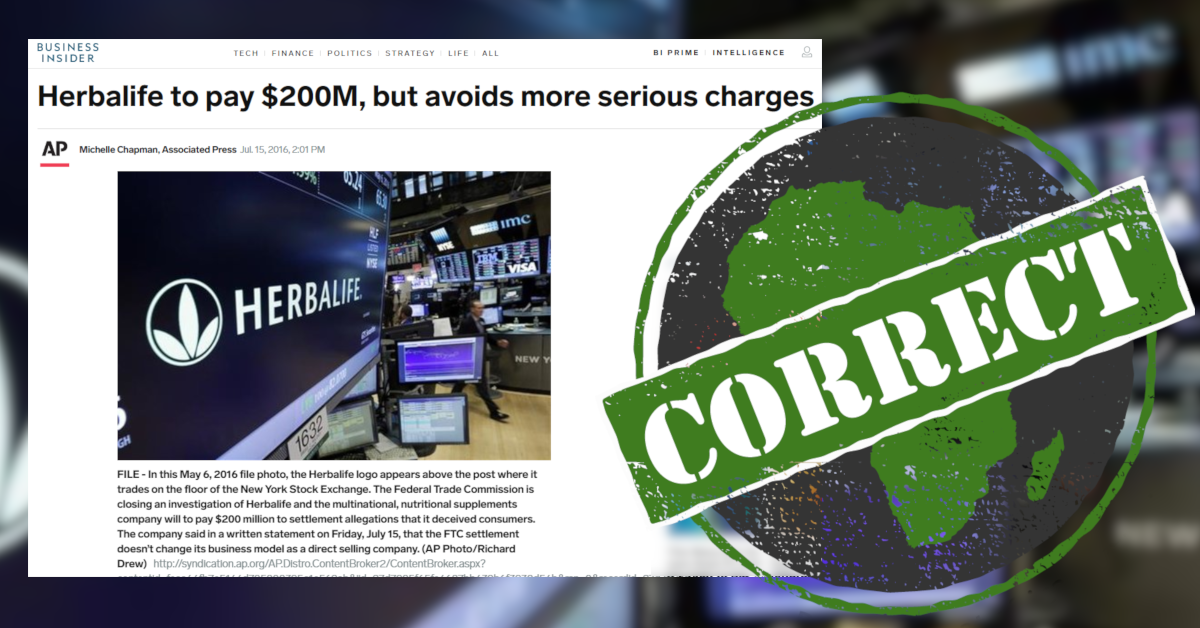Nutritional supplement company Herbalife is all over social media. As a multi-level marketing company, like Avon or Tupperware, its sales are based on the work of independent distributors who buy Herbalife products directly from the company and sell them on to others.
There have been past allegations that Herbalife paid distributors more money for recruiting other people to sell products than they would otherwise have earned from actually selling the products themselves.
Herbalife also operates in South Africa.
In 2016 there were a number of media reports that Herbalife had been charged with deceptive practices by the US Federal Trade Commission (FTC), a consumer protection agency, and had paid US$200 million to customers who had lost money due to the company’s practices.
Texan TV channel K-FOXTV also published an article on the matter, headlined “Herbalife charged with deceptive practices, agrees to $200 million settlement, changes”.
The 2016 article was recently shared on Facebook in South Africa, where the social network’s fact-checking system flagged it as possibly false.

In its 2016 lawsuit against Herbalife, the FTC said the Herbalife family of companies had “deceived consumers into believing they could earn substantial money selling diet, nutritional supplement, and personal care products”.
According to the FTC, Herbalife had been falsely advertising itself as “a way for people to quit their jobs and make the big bucks”. The FTC’s analysis found that it was “virtually impossible to make money selling Herbalife products” and on average half of Herbalife’s “sales leaders” earned less than $5 a month from actual product sales.
Herbalife was not designated a pyramid scheme.
In the end Herbalife and the FTC agreed on a $200 million settlement. The money is being used to pay people who may have lost money trying to run a Herbalife business.
Herbalife also agreed to restructure its business model from one where people are paid based on how many people they recruit to one where “compensation is calculated based upon verifiable retail sales”. – Africa Check
There have been past allegations that Herbalife paid distributors more money for recruiting other people to sell products than they would otherwise have earned from actually selling the products themselves.
Herbalife also operates in South Africa.
In 2016 there were a number of media reports that Herbalife had been charged with deceptive practices by the US Federal Trade Commission (FTC), a consumer protection agency, and had paid US$200 million to customers who had lost money due to the company’s practices.
Texan TV channel K-FOXTV also published an article on the matter, headlined “Herbalife charged with deceptive practices, agrees to $200 million settlement, changes”.
The 2016 article was recently shared on Facebook in South Africa, where the social network’s fact-checking system flagged it as possibly false.

The FTC settlement
In its 2016 lawsuit against Herbalife, the FTC said the Herbalife family of companies had “deceived consumers into believing they could earn substantial money selling diet, nutritional supplement, and personal care products”.
According to the FTC, Herbalife had been falsely advertising itself as “a way for people to quit their jobs and make the big bucks”. The FTC’s analysis found that it was “virtually impossible to make money selling Herbalife products” and on average half of Herbalife’s “sales leaders” earned less than $5 a month from actual product sales.
Herbalife was not designated a pyramid scheme.
In the end Herbalife and the FTC agreed on a $200 million settlement. The money is being used to pay people who may have lost money trying to run a Herbalife business.
Herbalife also agreed to restructure its business model from one where people are paid based on how many people they recruit to one where “compensation is calculated based upon verifiable retail sales”. – Africa Check
Republish our content for free
For publishers: what to do if your post is rated false
A fact-checker has rated your Facebook or Instagram post as “false”, “altered”, “partly false” or “missing context”. This could have serious consequences. What do you do?
Click on our guide for the steps you should follow.
Publishers guideAfrica Check teams up with Facebook
Africa Check is a partner in Meta's third-party fact-checking programme to help stop the spread of false information on social media.
The content we rate as “false” will be downgraded on Facebook and Instagram. This means fewer people will see it.
You can also help identify false information on Facebook. This guide explains how.


Add new comment